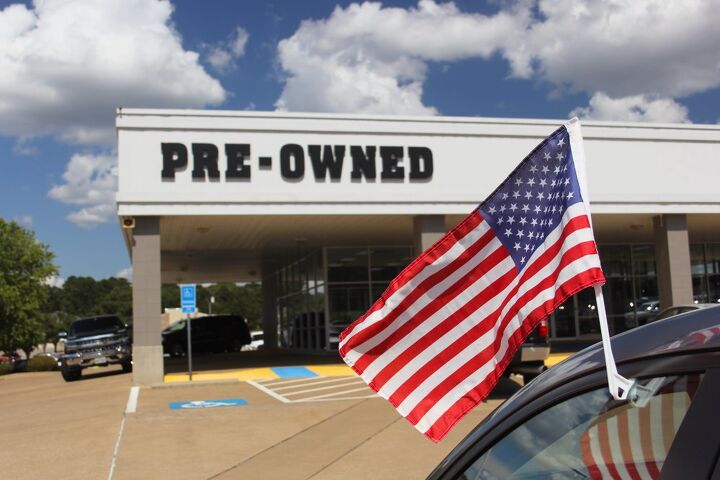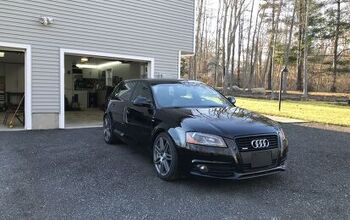Study Shows Auto Dealer Sentiment Still Ridiculously Positive

Car dealers have been polled for the fourth-quarter Cox Automotive Dealer Sentiment Index (CADSI) and they’re still incredibly optimistic, despite losing some of their earlier confidence that new-vehicle sales would be relatively healthy.
The dealer optimism – especially among franchised entities – seems to be wholly tied to profitability here. New vehicle sales dropped in 2019 and absolutely cratered in 2020 due to the nation’s response to the pandemic. In spite of there being plenty of talking heads in the news media telling you not to stress about the economy, inflation has created pricing increases across the board and automobiles are at the tippy top of that list. With inventories remaining relatively lean due to production slowdowns, staggering dealer markups have become the norm. Basically, stores just seem happy that they can charge more per car while they’re in short supply. But they’re also starting to have concerns about the long-term viability of the market and are are feeling the pinch of rising operating costs.
The growth that was projected for 2021 isn’t shaping up as claimed. Unless December turns out to be a record breaking sales period, America’s vehicle sales for the year could actually be lower than the previous two. Officially, Cox stated that the current dealer sentiment is slightly less positive than in the third quarter (2021) for both franchised and independent dealers but remains well above average. The market is still able yield retailers more than would have been possible during a period of stable production, however the profit index still declined a bit from the record highs set in the previous quarter.
From Cox:
The new-vehicle sales index fell to 45 [out of a possible 100] in Q4 – below the 50 threshold for only the second time since the survey was launched in 2017 – indicating that more dealers view new-vehicle sales as poor as opposed to good. Meanwhile, the used-vehicle sales index declined for the second straight quarter, but stayed above the 50 threshold at 53, indicating more dealers view used-vehicle sales as good as opposed to poor.
The key drivers of sentiment saw marginal shifts in Q4. The 3-month market outlook index was flat compared to the prior quarter. With a Q4 reading of 60, it represents that more dealers see the market in the next 3 months as strong than see it as weak. The overall profits index saw a modest decline compared to the prior quarter with a reading of 57, reflecting that dealers feel that profits are strong, although not as strong as the previous quarter. The price pressure index saw a statistically significant decrease, falling below last quarter’s reading to a record low 32. This Q4 reading indicates fewer dealers feel pressure to lower their prices.
If you want to see just how wild pricing can get when fewer shops feel pressure to lower their rates, we’ve covered the issue more than once this year. Those of you who are currently shopping for a new or used automobile need not bother, however, as you’re likely to be under an immense amount of psychological strain already.
“Dealer sentiment again saw modest declines in the fourth quarter as sales remain challenged by the ongoing inventory crunch,” said Cox Automotive Chief Economist Jonathan Smoke. “However, strong pricing power kept profits at near-record levels, especially for franchised dealers. Dealers view the economy as strong heading into the winter and are much more optimistic about the spring compared to their views a year ago. The biggest worry for dealers beyond inventory is the impact of rising costs.”
Of course, while those franchised dealers are cleaning up, smaller shops are finding it substantially more difficult to maintain their inventories and benefit from having consumers held largely at the mercy of the market. This has resulted in many taking factory buyouts or selling their locations to competitors with larger networks.
However pretty much everyone told Cox that they thought vehicle inventories were exceptionally poor, with many likewise admitting that was the magic bullet that helped improve profits. The outlet’s new-vehicle inventory index of 14 saw a tepid 1-point increase from last quarter. Though it remains suppressed by 34 points compared to Q4 2020 as the perception gap widened:
Used-vehicle inventory improved by 1 point for franchised dealers in Q4, but the overall used-vehicle inventory index saw a modest quarter-over-quarter decline, decreasing 2 points to 29. The gap between franchised and independent perceptions of used-vehicle inventory grew to 10 points from 5 points last quarter.
The new-vehicle sales index fell to 45 in Q4, indicating that more dealers view sales as poor as opposed to good. The view of new-vehicle sales was down marginally from last quarter and down significantly compared to the fourth quarter of last year. This sentiment reflects the reality of dealers seeing month after month of declining sales in the second half of 2021.
Operating costs are also up, with an overwhelming majority of dealers chiming in to yield the highest index score (for the category) in CADSI history at 71. This was primarily attributed to needing to spend more on buying and/or reconditioning wholesale vehicles. However shops also said labor and more general operating costs has also been rising.
While the survey isn’t necessarily indicative of the entire American market, CADSI is a fairly robust tool for calculating the general vibe dealerships have on various issues. For Q4 Cox had 1,123 U.S. dealer respondents 595 franchised entities and 528 independent stores. Dealer responses are weighted by dealership type and volume of sales to be representative of the national dealer population. For each aspect of the market surveyed, those providing answers are given an option that relates to strong/increasing, average/stable, or weak/decreasing, along with a “don’t know” opt-out. Indices are calculated by creating a mean score out of a possible 100 – with higher number representing the strong/increasing side of things and low figures representing a weak/decreasing sentiment.
[Image: LM Photos/Shutterstock]

A staunch consumer advocate tracking industry trends and regulation. Before joining TTAC, Matt spent a decade working for marketing and research firms based in NYC. Clients included several of the world’s largest automakers, global tire brands, and aftermarket part suppliers. Dissatisfied with the corporate world and resentful of having to wear suits everyday, he pivoted to writing about cars. Since then, that man has become an ardent supporter of the right-to-repair movement, been interviewed on the auto industry by national radio broadcasts, driven more rental cars than anyone ever should, participated in amateur rallying events, and received the requisite minimum training as sanctioned by the SCCA. Handy with a wrench, Matt grew up surrounded by Detroit auto workers and managed to get a pizza delivery job before he was legally eligible. He later found himself driving box trucks through Manhattan, guaranteeing future sympathy for actual truckers. He continues to conduct research pertaining to the automotive sector as an independent contractor and has since moved back to his native Michigan, closer to where the cars are born. A contrarian, Matt claims to prefer understeer — stating that front and all-wheel drive vehicles cater best to his driving style.
More by Matt Posky
Latest Car Reviews
Read moreLatest Product Reviews
Read moreRecent Comments
- Spectator This was an amazing vehicle. Back then Acura knew how to make a plush and comfy seat!
- Syke F1 fan and normally watch every race, although most of them are DVR'd. I've got my Xfinity box set up to record everything automatically. This past Sunday I watched the race live for a change.
- Jalop1991 There is no inflation. Everything is cheaper than it was 5 years ago. SHRIMP AND GRITS!
- ChristianWimmer Exterior and interior look pretty flawless for such a high mileage car. To me this is an indication that it was well-maintained and driven responsibly. It’s not my cup of tea but it’s bound to find an enthusiastic owner out there.And with ANY car, always budget for maintenance.
- Fred I'm a fan and watch every race. I've missed a few of the live races, but ESPN repeats them during more reasonable hours.


































Comments
Join the conversation
I'd be happy for new car dealers to disappear along with right to repair becoming the law of the land. Then let honest, skilled repair shops rise to the top and be allowed to do warrantee covered work. Based on my recent seller interaction with Carvana I would welcome the opportunity to buy a new car in a similar manner. I'd even buy used this way since they allow a return policy that seems reasonable.
Dealers provided two very important buffers for the Makers... They can be persuaded to eat over-runs of production...when someone guesses wrong, that factory can't be just stopped...the line runs. The dealers will get sales-banked, or told you need 10 dogs for each hot item. Dealers also buffer when the factory makes a mistake. We've all suffered one or another problem with production, be it shoddy part or poor engineering. When a repair goes badly, it's Ripoff Ford, not Fomoco that gets the problem. For all the whining, it's a marriage...